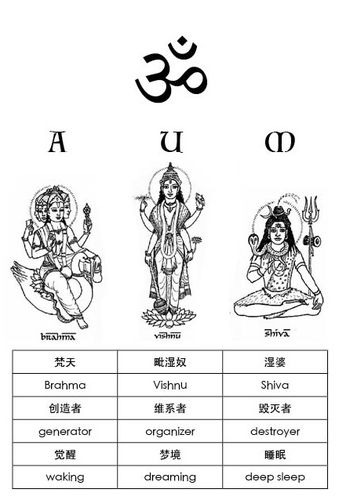Om in Vedas: A Deep Dive into the Sacred Mantra
Have you ever wondered about the significance of the word “Om” in the ancient Vedas? This sacred mantra, pronounced as “Aum,” holds immense importance in Hinduism and is considered to be the primordial sound from which the universe emerged. In this article, we will explore the various dimensions of “Om” in Vedas, including its origins, meanings, and its role in Hindu rituals and spirituality.
Origins of Om
The origins of “Om” can be traced back to the Vedas, the oldest sacred texts of Hinduism. The Rigveda, the oldest of the four Vedas, contains the mantra in its opening verse. The word “Om” is believed to be a representation of the infinite and the eternal. It is considered to be the sound of the universe and is often associated with the creation, preservation, and destruction of the world.

Meanings of Om
Om is a multi-dimensional word with various meanings. It is often translated as “the universe,” “the infinite,” or “the eternal.” Here are some of the key meanings of Om:
-
The universe: Om is considered to be the sound of the universe, representing its infinite nature.
-
The infinite: Om symbolizes the boundless and the endless, representing the infinite possibilities of existence.
-
The eternal: Om is associated with the eternal cycle of creation, preservation, and destruction.

-
The divine: Om is considered to be the sound of the divine, representing the presence of God in the universe.
Role in Hindu Rituals and Spirituality
Om plays a significant role in Hindu rituals and spirituality. It is often chanted during prayers, meditation, and other religious ceremonies. Here are some of the ways in which Om is used in Hinduism:
-
Meditation: Om is chanted during meditation to focus the mind and achieve a state of inner peace.
-
Prayer: Om is often chanted at the beginning and end of prayers to invoke the presence of the divine.
-
Yoga: Om is chanted during yoga practices to connect with the universal energy and achieve spiritual balance.
-
Weddings: Om is chanted during Hindu weddings to symbolize the union of the bride and groom with the divine.
Om in Different Vedas
The significance of Om varies in different Vedas. Here is a brief overview of its role in each Veda:
| Veda | Role of Om |
|---|---|
| Rigveda | Opening mantra, symbolizing the creation of the universe |
| Samaveda | Used in rituals and prayers, representing the divine presence |
| Yajurveda | Chanted during sacrifices and rituals, symbolizing the eternal cycle of creation |
| Atharvaveda | Used for healing and protection, representing the power of the divine |
Conclusion
Om, the sacred mantra of the Vedas, holds immense importance in Hinduism. Its origins, meanings, and role in rituals and spirituality make it a significant part of Hindu culture and tradition. Whether you are a follower of Hinduism or simply curious about the ancient wisdom of the Vedas, understanding the significance of Om can provide a deeper insight into the spiritual beliefs and practices of this ancient religion.




